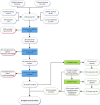Urgent need to modernize pharmacovigilance education in healthcare curricula: review of the literature
- PMID: 29926135
- PMCID: PMC6132536
- DOI: 10.1007/s00228-018-2500-y
Urgent need to modernize pharmacovigilance education in healthcare curricula: review of the literature
Abstract
Objectives: Pharmacovigilance education is essential since adverse drug reactions (ADRs) are a serious health problem and contribute to unnecessary patient burden and hospital admissions. Healthcare professionals have little awareness of pharmacovigilance and ADR reporting, and only few educational interventions had durable effects on this awareness. Our future healthcare providers should therefore acquire an adequate set of pharmacovigilance competencies to rationally prescribe, distribute, and monitor drugs. We investigated the pharmacovigilance and ADR-reporting competencies of healthcare students to identify educational interventions that are effective in promoting pharmacovigilance.
Methods: The PubMed, EMBASE, Cochrane, CINAHL, PsycINFO, and ERIC databases were searched using the terms "pharmacovigilance," "students," and "education.".
Results: Twenty-five cross-sectional and 14 intervention studies describing mostly medical and pharmacy students were included. Intentions and attitudes on ADR reporting were overall positive, although most students felt inadequately prepared, missed the training on this topic, and lacked basic knowledge. Although nearly all students observed ADRs during clinical rounds, only a few had actually been involved in reporting an ADR. Educational interventions were predominately lectures, sometimes accompanied by small interactive working groups. Most interventions resulted in a direct increase in knowledge with an unknown long-term effect. Real-life learning initiatives have shown that healthcare students are capable of contributing to patient care while increasing their ADR-reporting skills and knowledge.
Conclusions: There is an urgent need to improve and innovate current pharmacovigilance education for undergraduate healthcare students. By offering real-life pharmacovigilance training, students will increase their knowledge and awareness but can also assist current healthcare professionals to meet their pharmacovigilance obligations.
Keywords: Medical education; Pharmacotherapy; Pharmacovigilance.
Conflict of interest statement
Conflict of interest
The authors declare that they have no conflict of interest.
Originality and agreement statement
All of the authors declare that this work has not been and will not be published in whole or part in any other journals, and agree to the contents of the manuscript in its submitted form.
Figures
References
-
- Brinkman DJTJ, Mokkink LB, Christiaens T, Likic R, Maciulaitis R, Costa J, Sanz EJ, Maxwell SR, Richir MC, van Agtmael MA, Education Working Group of the European Association for Clinical Pharmacology and Therapeutics (2017) Key learning outcomes for clinical pharmacology and therapeutics education in Europe: a modified Delphi study. Clin Pharmacol Ther - PubMed
-
- de Vries TPGM, Henning RH, Hogerzeil HV, Fresle DA. Guide to good prescribing—a practical manual. Geneva: WHO; 1994.
-
- Abdullahi Rabiu Abubakar MH. Pharmacovigilance practice: the current challenges and the gaps in the medical students’ curriculum. J App Pharm Sci. 2016;6(05):210–2015. doi: 10.7324/JAPS.2016.60532. - DOI
Publication types
MeSH terms
LinkOut - more resources
Full Text Sources
Other Literature Sources
Research Materials


